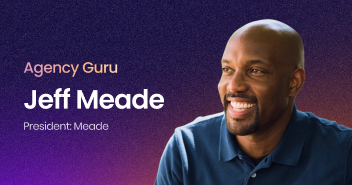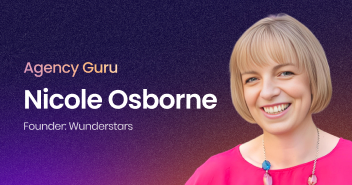If there is someone you are looking forward to following in the PHP community, then Sammy Kaye Powers is your go to guy! Sammy is a very active guy in the PHP Community. He is the host of PHP roundtable podcast and the co-organizer of Chicago PHP user group.

Along with being an active member of the PHP community, he has in his arsenal more than 15 years of experience in web development, along with having vast experience in Laravel. He is also a contributor of the official Facebook PHP SDK v5. In this interview with Cloudways, Sammy shared his views about PHP7, Laravel, Facebook and The PHP Community and how an amateur can benefit from becoming an active part of the community.
Cloudways: Sammy, let’s start by introducing you to our readers. Tell me about yourself? How did you start your journey in development? When was the first time you used PHP and when did you fall in love with it?
Sammy: My first exposure to programming was back in the 90’s at a friend’s birthday party. My friend David was showing off a program he wrote in QBASIC which would ask for your name and age and output silly text on the screen. I was amazed at this hello-world-style program and begged David to teach me how he did it. The next night I remember spending 3 hours on the phone with David as he walked me through all the steps necessary to write a QBASIC app.
After a year of learning QBASIC and writing one crappy program after another, David suggested we learn HTML and said the web was going to be the next big thing. I’m so glad I listened to him because he was right. We both started to learn PHP 3 back in 1998 and made websites to host our custom Duke Nukem 3D maps.
Cloudways: You are the creator and host of PHP roundtable podcasts. How do you differentiate PHP roundtable podcast from other podcasts? How has it catered to the PHP community? Would you like to mention anyone who have worked with you in making PHP Roundtable a success?
Sammy: The idea for the PHP Roundtable podcast sparked from a conversation at php|tek 2014. It was my second developer conference and I remember sitting at a table with several PHP community leaders and coders while we were discussing PHP internals. I had lots of questions for them that they were happy to answer and discuss amongst themselves. I thought to myself, “It’d be really great if this conversation could be made public so others could learn from it too.”
Three months later, the PHP Roundtable podcast was born. Instead of doing one-on-one interviews like most podcasts, the PHP Roundtable brings on a panel of experts to discuss a particular topic at length. The ultimate goal of the podcast is to learn something new with each episode and hopefully inspire programmers to contribute back to the community in some way.
The podcast would have never taken off like it did if it weren’t for the willingness of PHP community leaders to take the time out of their busy schedules to come on the podcast and share their knowledge with others. I’m always amazed at how willing the community is willing to help others out.
Cloudways: Sammy, you have two different PHP frameworks to your credit as a contributor, Laravel and Silex. How would you rank these two? Which one is better? How do these frameworks help PHP web developers?
Sammy: I’ve contributed to various open source projects including Laravel (but not Silex). I’ve used a number of PHP web frameworks but the two that have been most beneficial for my particular niche of Facebook app development are Laravel & Silex.
Laravel is a fully featured, opinionated web framework that is really great if you want to get something up and running as fast as possible. In the online social marketing industry, rapid application development (RAD) is paramount. Laravel allows me to very quickly tie my web app into the various server environments that my Facebook app would need.
Silex is a microframework with very few opinions about how you should write your web app. What makes it handy for my niche is that it’s very small and lightweight. I use it for the smaller Facebook apps that don’t need anything fancy.
Cloudways: You are a PHP developer of Facebook Apps. You have made significant contributions in official facebook PHP pages. There are people who say that PHP doesn’t exist on facebook. What is your input regarding this?
Sammy: I’m not really sure what people mean when they say PHP doesn’t exist on Facebook. Facebook wrote their own runtime called HipHop Virtual Machine (HHVM) which runs PHP very efficiently. They also created a new language based on PHP called Hack. So perhaps people are saying that Facebook doesn’t run on PHP anymore which is technically true; Facebook runs on HHVM and Hack.
However, that isn’t to say Facebook has abandoned the PHP community. The HHVM internals team has worked tirelessly to support the latest features of PHP as new PHP versions are released.
And it’s not just internals; Facebook has a number of actively-maintained open source PHP projects. I cut my teeth in open source world with the official Facebook PHP SDK. Facebook has been really great in accepting feedback from the PHP community to make the Facebook PHP SDK better.
Cloudways: Community is important. How do you view the growth of the PHP community? What would you like to recommend to PHP community members? Being an official contributor to PHP SDK v5, what prerequisites you think are needed for a novice developer before coming on to PHP sdk development?
Sammy: PHP’s amazing community is one of the things that really sets PHP apart from other languages. Community is paramount to the ongoing success of PHP. If you’re not involved in the community yet, there’s lots of ways to get involved; join your local PHP user group, follow @phpc on twitter; get paired with a mentor or mentee at phpmentoring.org; start getting involved with PHP internals by contributing to the docs, writing tests, triaging bugs, or even writing new features; contribute to PHP open source projects; and the list goes on and on. You don’t have to do all of those things, but doing even one of them makes you a valuable asset to the community.
To your question about what prerequisites there are for contributing to the Facebook PHP SDK, there are a few. You need to learn:
- PHP
- Git (at least some commands, but there are GUI’s for this)
- GitHub
- Testing with phpunit
And you need a desire to be awesome by contributing to the open source world. I wrote a guide to contributing to open source projects on GitHub that should help a newbie get started.
Cloudways: You have also been a speaker at Nomad PHP. How was your experience at the event? Would you like to mention any personality from the event which inspired you the most?
Sammy: Nomad PHP is a virtual user group for those who don’t have a local PHP user group in their area. I presented a lightning talk on the Facebook PHP SDK a while back and had a blast doing it. One of the main drivers of that initiative is Cal Evans and he as inspired me and many others to get more involved in the PHP community.
Improve Your PHP App Speed by 300%
Cloudways offers you dedicated servers with SSD storage, custom performance, an optimized stack, and more for 300% faster load times.
Cloudways: You are a Contributor to the official PHP documentation. What factors do you think are necessary to contribute in PHP documentation? What guidelines do you follow?
Sammy: Contributing to the PHP manual isn’t all that difficult. There’s an online GUI at edit.php.net that allows anyone to make changes. Once your changes are approved by someone with direct access to the docs repos, they will get merged into the manual.
If you want to gain direct access to the PHP doc repos to make more significant changes, you can follow my guide to contributing to the PHP manual.
Cloudways: PHP 7 is nearing its release. What expectations do you have from PHP 7? What would be its impact on the development world?
Sammy: PHP 7 is out in the wild finally! Yay! In the past, very old and insecure versions of PHP have notoriously sat unattended on myriad production servers for years and years. My hope is that as PHP internal starts releasing PHP on a more regular schedule, the server admins around the world will be pressured to upgrade their PHP versions regularly. That will give us a more secure and more performing web.
Cloudways: Scribbling through your social profiles, I got to know that you love dancing! What type of dance do you like? What kind of music do you like dancing to?
Sammy: I’m obsessed with a dance called West Coast Swing. Most people hear the word “swing” and images of poodle skirts and people doing flips pop into their head. West Coast Swing isn’t that at all. It’s a very diverse dance that lets you dance to pretty much any song in 4/4 timing which means you can dance it at any random nightclub you visit.
It’s quite impossible to explain West Coast Swing so check out two of the top WCS dancers Ben Morris & Susan Kirklin perform an improv dance in a competition called a “Jack & Jill”.
My dance partner and I travel around the States performing in a routine division. We recently performed at the biggest WCS competition in the world for routine divisions called the US Open. It was a blast. We go to one or two dance competitions a month.
Cloudways: Cloud hosting has now gained a lot of ground in terms of optimization and reliability. Have you had a chance to go through the revolutionary Cloudways Managed Cloud Hosting platform? In your opinion, what is an optimized hosting stack for PHP?
Sammy: I have browsed the Cloudways website and I am impressed with the features Cloudways offers. Maybe in a future project I’ll be knocking on your door to try your service. 🙂
As far as optimized stack, I’d say if you’re running PHP 7 or HHVM, you’re off to a nice start!
Ahmed Khan
Ahmed was a PHP community expert at Cloudways - A Managed PHP Hosting Cloud Platform. He is a software engineer with extensive knowledge in PHP and SEO. He loves watching Game of Thrones is his free time. Follow Ahmed on Twitter to stay updated with his works.


